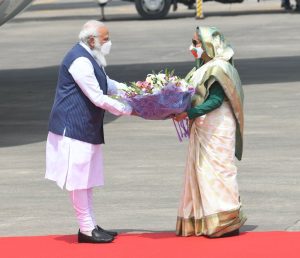Indian Prime Minister Narendra Modi is in Bangladesh for a two-day visit starting March 26, to participate in the National Day celebrations that day that mark the 100th birth anniversary of Bangladesh’s founding father, first president and later, prime minister, Sheikh Mujibur Rahman, as well as Bangladesh’s 50th independence anniversary.
On the eve of his departure for Bangladesh, a statement from Modi laid out details of his engagements during the trip, which includes a visit to a Hindu religious shrine, meeting with representative of the Matua community, as well as taking part in the National Day celebrations. According to Modi’s statement, he will also be meeting with key political leaders, including members of Prime Minister Sheikh Hasina’s cabinet.
This is Modi’s first foreign trip since the outbreak of the COVID-19 pandemic last year.
On his arrival in Dhaka, Modi was welcomed at the airport by Hasina and other members of her cabinet in what was described by the Indian Ministry of External Affairs as a “special gesture.” According to the ministry, at the time of writing Modi has met with both ruling alliance as well as opposition parties’ representatives and had a meeting with Bangladesh’s Foreign Minister Dr. A.K. Abdul Momen.
“Both the Leaders reflected on deepening the fraternal ties and strengthening the all-encompassing partnership based on sovereignty, equality, trust and understanding that transcends a strategic partnership between the two countries,” it has stated.
Modi also awarded the 2020 Gandhi Peace Prize posthumously – the first time in its history to have been done so — to Rehman, handing the prize to Sheikh Rehana, Rehman’s younger daughter and sister of Hasina. Speaking at the ceremony, Modi also noted the contribution of the Indian Army in what is considered a war of liberation in Bangladesh that saw the nation created out of Pakistan’s eastern wing in 1971.
The 1971 India-Pakistan war was, by far, the most serious of the four the two archrivals have fought and was indelibly colored by Cold War geopolitics.
As I argued in December in these pages, this year’s celebrations in Bangladesh and India around the country’s creation as well as India’s unambiguous victory in the 1971 war stand to be important for Modi and the ruling Bharatiya Janata Party (BJP) in three distinct ways. First, the historical milestones offer a natural opportunity for both countries to push aside irritants that have plagued their relationship in the recent years. Second, on the domestic front, it offers the BJP an incentive to modulate (its often jarring) rhetoric around illegal immigration of Muslims from Bangladesh in the run-up to the polls in the Indian state of West Bengal next month. Finally, it allows the Modi government to use the 50th anniversary of the India-Pakistan war to once again remind the BJP’s core nationalist base about India’s past military prowess.
On its part, Bangladesh seems to be, at least in public, playing along. In a March 25 interview to the Indian Express, Hasina’s foreign affairs adviser Gowher Rizvi described India as Bangladesh’s “most important neighbor,” and made all the right noises when it came to China, noting that Dhaka’s relationship with Beijing will not come at the expense of its ties with New Delhi. The advisor also described a proposed and controversial Indian National Register for Citizens as an “internal exercise” with no bearing on the bilateral relationship – a formulation likely to come as music to the ears of those in the Modi government and the BJP.

































